A Round-Up of the Most Beneficial Food Supplements
Published: July 11, 2025 at 1:12:28 PM UTC
The world of dietary supplements can be overwhelming, with countless options promising remarkable health benefits. Americans spend billions annually on nutritional supplements, yet many wonder which ones truly deliver results. This comprehensive guide examines the most beneficial food supplements backed by scientific research, helping you make informed choices for your health and wellness journey.

Understanding Dietary Supplements: Benefits and Limitations
Various dietary supplements offer different health benefits, but should complement a balanced diet
Dietary supplements are designed to complement your nutrition, not replace a balanced diet. While a varied diet rich in fruits, vegetables, lean proteins, and whole grains remains the foundation of good health, certain supplements can help fill nutritional gaps or address specific health concerns.
Before adding any supplement to your routine, it's important to understand that the supplement industry isn't strictly regulated like pharmaceuticals. In the United States, supplements don't require FDA approval before hitting store shelves, making it crucial to choose products from reputable manufacturers that undergo third-party testing.
Always consult with your healthcare provider before starting any supplement regimen, especially if you have existing health conditions or take medications that might interact with supplements.
Best for Bone Health: Vitamin D
Key Benefits
Vitamin D plays a crucial role in calcium absorption, supporting bone health and preventing conditions like osteoporosis. Research also links adequate vitamin D levels to improved immune function, reduced inflammation, and potentially lower risks of certain cancers and heart disease.
Who Needs It Most
- Adults over 60, especially those with limited sun exposure
- People with darker skin tones
- Those living in northern climates with limited sunlight
- Individuals with certain digestive disorders affecting nutrient absorption
- People who cover their skin for cultural or religious reasons
Usage Tips
The recommended daily allowance for most adults is 600-800 IU (15-20 mcg), though many experts suggest 1,000-2,000 IU for optimal health. Take vitamin D supplements with a meal containing some fat to enhance absorption. Blood tests can determine your current levels and help establish the right dosage.
Excessive vitamin D supplementation (typically above 4,000 IU daily) can lead to toxicity, causing nausea, kidney problems, and dangerous calcium buildup in the blood. Never exceed recommended dosages without medical supervision.
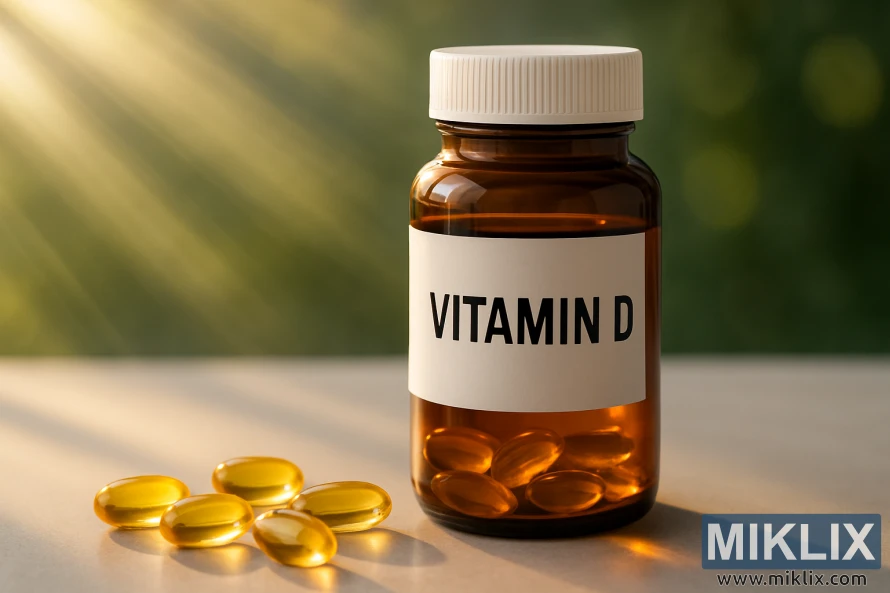
Best for Heart and Brain Health: Omega-3 Fatty Acids
Key Benefits
Omega-3 fatty acids, particularly EPA and DHA found in fish oil, support cardiovascular health by reducing inflammation, lowering triglyceride levels, and potentially reducing blood pressure. They also promote brain health, may improve cognitive function, and have been linked to reduced symptoms of depression.
Who Needs It Most
- People with elevated triglyceride levels
- Those with cardiovascular risk factors
- Individuals who rarely consume fatty fish
- People with inflammatory conditions
- Pregnant and breastfeeding women (for fetal brain development)
Usage Tips
Most research suggests benefits from 250-1,000 mg combined EPA and DHA daily. Higher doses may be recommended for specific conditions like high triglycerides. Take with meals to minimize any fishy aftertaste and reduce digestive discomfort. Store in a cool place to prevent rancidity.
Vegans and vegetarians can find plant-based omega-3 supplements derived from algae, which provide DHA similar to fish oil without animal products.

Best for Gut Health: Probiotics
Key Benefits
Probiotics are beneficial bacteria that support digestive health by maintaining a balanced gut microbiome. Research shows they can help prevent and treat diarrhea, reduce symptoms of irritable bowel syndrome (IBS), and potentially boost immune function. Some studies suggest benefits for mental health through the gut-brain connection.
Who Needs It Most
- People taking or recovering from antibiotic treatment
- Those with digestive disorders like IBS or inflammatory bowel disease
- Individuals with frequent digestive discomfort
- People with compromised immune systems
- Those experiencing stress-related digestive issues
Usage Tips
Look for multi-strain formulas with at least 1 billion CFUs (colony-forming units). Specific strains matter for different conditions—Lactobacillus and Bifidobacterium species are well-researched for general gut health. Take consistently for at least 4-8 weeks to evaluate benefits. Some probiotics require refrigeration to maintain potency.
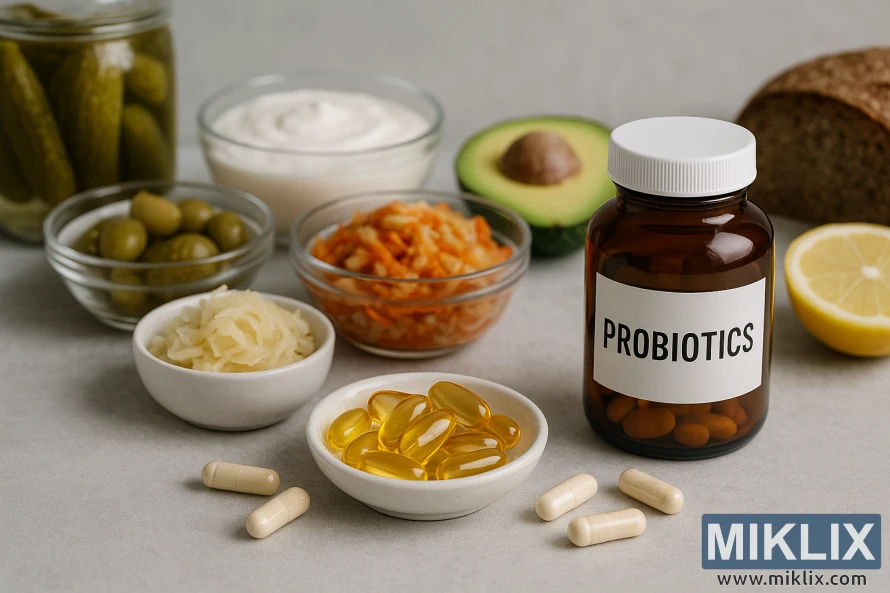
Best for Stress and Sleep: Magnesium
Key Benefits
Magnesium is involved in over 300 biochemical reactions in the body, supporting muscle and nerve function, energy production, and protein synthesis. It helps regulate blood pressure, supports bone health, and plays a crucial role in managing stress and promoting restful sleep.
Who Needs It Most
- People with high stress levels
- Those experiencing sleep difficulties
- Individuals with muscle cramps or tension
- People with digestive conditions affecting absorption
- Those taking certain medications (diuretics, antibiotics, etc.)
- Older adults with decreased absorption capacity
Usage Tips
The recommended daily allowance is 310-420 mg for adults. Different forms offer varying benefits: magnesium glycinate is best for sleep and stress, magnesium citrate for constipation, and magnesium malate for energy and muscle function. Take with food to improve absorption and reduce digestive discomfort.
Taking magnesium in the evening may help promote relaxation and better sleep quality.
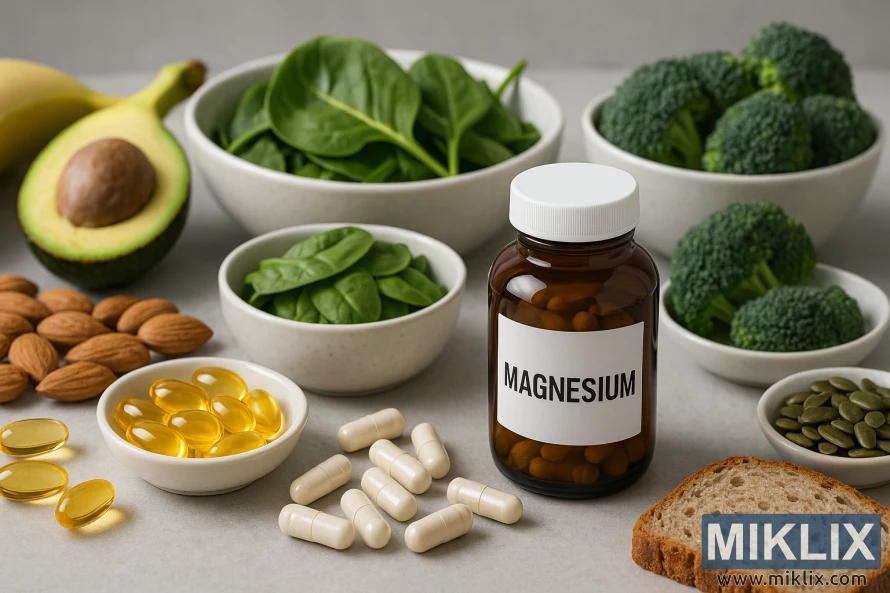
Best for Energy and Nerve Function: Vitamin B12
Key Benefits
Vitamin B12 is essential for red blood cell formation, neurological function, and DNA synthesis. Adequate B12 levels help prevent anemia, support energy production, and maintain healthy nerve function. Some research suggests it may play a role in mood regulation and cognitive health.
Who Needs It Most
- Adults over 50 (absorption decreases with age)
- Vegetarians and vegans
- People with digestive disorders affecting absorption
- Those taking certain medications (metformin, acid reducers)
- Individuals with pernicious anemia
Usage Tips
The recommended daily amount is 2.4 mcg for most adults, though supplements typically contain much higher doses (250-1,000 mcg) because absorption rates vary. Sublingual (under-the-tongue) forms may improve absorption, especially for those with digestive issues. B12 is water-soluble, so excess is generally excreted rather than stored.
Pros of B12 Supplementation
- May increase energy levels
- Supports healthy nerve function
- Essential for vegetarians/vegans
- Generally considered very safe
Cons of B12 Supplementation
- May interact with certain medications
- High doses can mask folate deficiency
- Some people report acne as a side effect
- Unnecessary if levels are already adequate
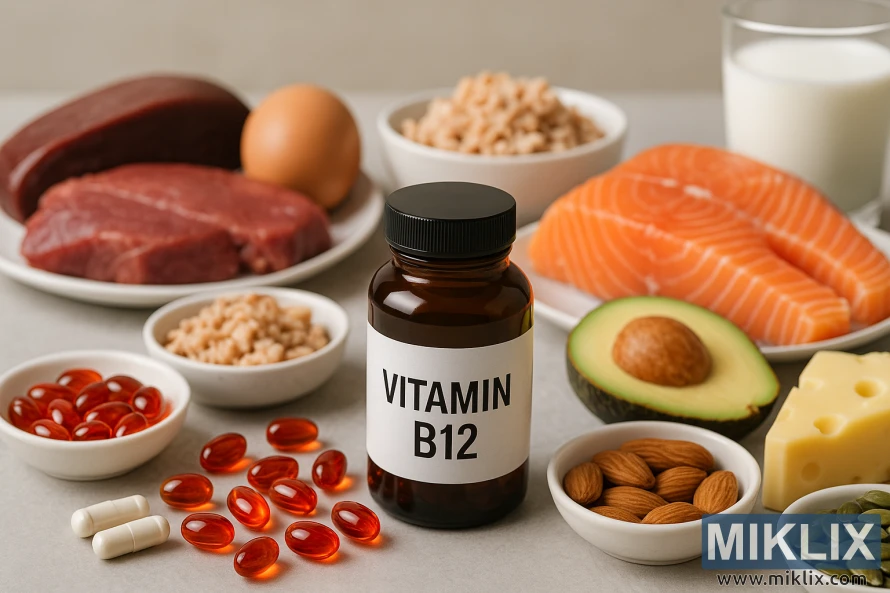
Best for Immunity: Vitamin C
Key Benefits
Vitamin C is a powerful antioxidant that supports immune function, helps the body absorb iron, and is essential for collagen production. Research suggests it may reduce the duration of colds, support skin health, and protect cells from oxidative damage.
Who Needs It Most
- Smokers (require 35 mg more daily than non-smokers)
- People with limited access to fresh fruits and vegetables
- Those with increased oxidative stress (athletes, pollution exposure)
- Individuals with wounds or recovering from surgery
- People with frequent infections or compromised immunity
Usage Tips
The recommended daily amount is 75-90 mg for adults, though many supplements provide 500-1,000 mg. The body absorbs smaller doses more efficiently, so consider dividing larger amounts throughout the day. Take with food to reduce potential stomach upset. Vitamin C is water-soluble, so excess is generally excreted.
High doses (typically above 2,000 mg daily) may cause digestive discomfort, including diarrhea and nausea in some individuals.
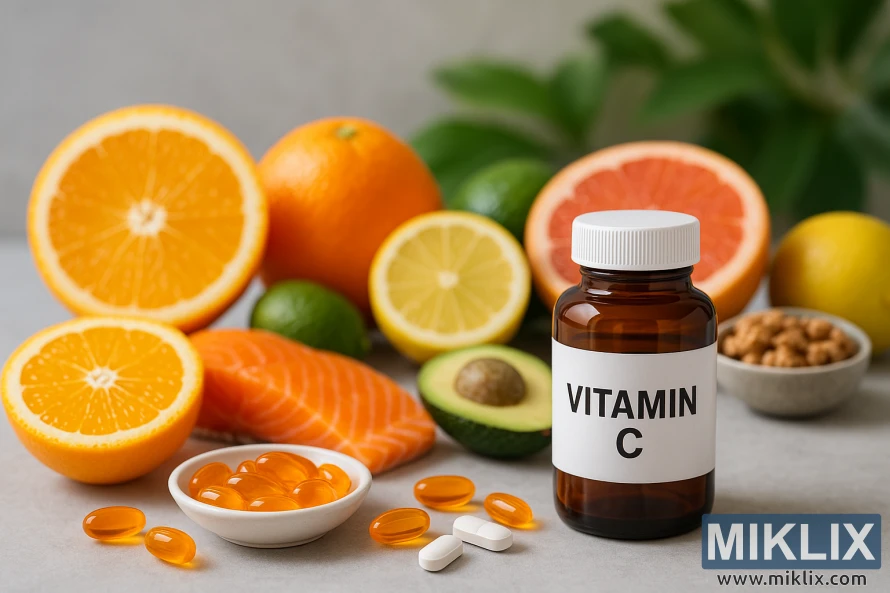
Best for Blood Health: Iron
Key Benefits
Iron is essential for hemoglobin production, which carries oxygen throughout the body. Adequate iron levels prevent anemia, support energy production, and maintain proper immune function. Iron also plays a role in cognitive development and physical performance.
Who Needs It Most
- Menstruating women, especially those with heavy periods
- Pregnant women
- Infants and young children during growth periods
- Frequent blood donors
- People with certain digestive disorders affecting absorption
- Vegetarians and vegans (plant iron is less bioavailable)
Usage Tips
The recommended daily amount varies by age and gender: 8 mg for adult men and postmenopausal women, 18 mg for menstruating women. Take iron supplements on an empty stomach if possible, though they can be taken with food if stomach upset occurs. Vitamin C enhances absorption, while calcium, coffee, and tea can inhibit it.
Iron supplements can be harmful for people who don't need them. Always confirm deficiency through blood tests before supplementing. Store iron supplements away from children, as iron overdose can be fatal.
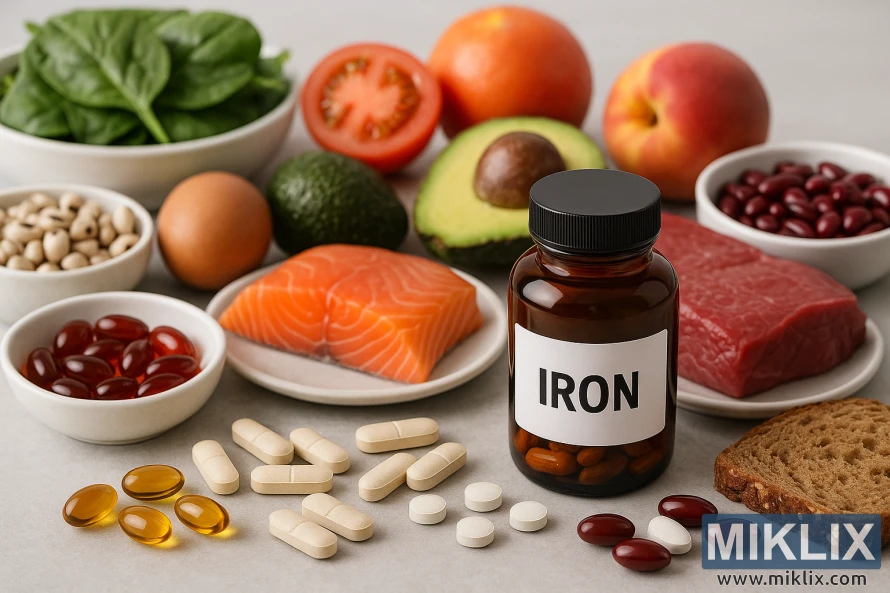
Best for Bone Strength: Calcium
Key Benefits
Calcium is the most abundant mineral in the body, primarily stored in bones and teeth. It's essential for bone health, muscle function, nerve transmission, and blood clotting. Adequate calcium intake throughout life helps prevent osteoporosis and maintain bone density.
Who Needs It Most
- Postmenopausal women
- Adults over 50
- People with lactose intolerance or dairy allergies
- Those with limited calcium intake from food
- Individuals with certain digestive disorders affecting absorption
Usage Tips
The recommended daily amount is 1,000-1,200 mg for adults, depending on age and gender. The body absorbs calcium more efficiently in doses of 500 mg or less, so divide larger amounts throughout the day. Take with vitamin D to enhance absorption. Calcium citrate can be taken with or without food, while calcium carbonate should be taken with meals.
Excessive calcium supplementation (above 2,000 mg daily) may increase the risk of kidney stones and potentially cardiovascular issues. Focus on food sources when possible.
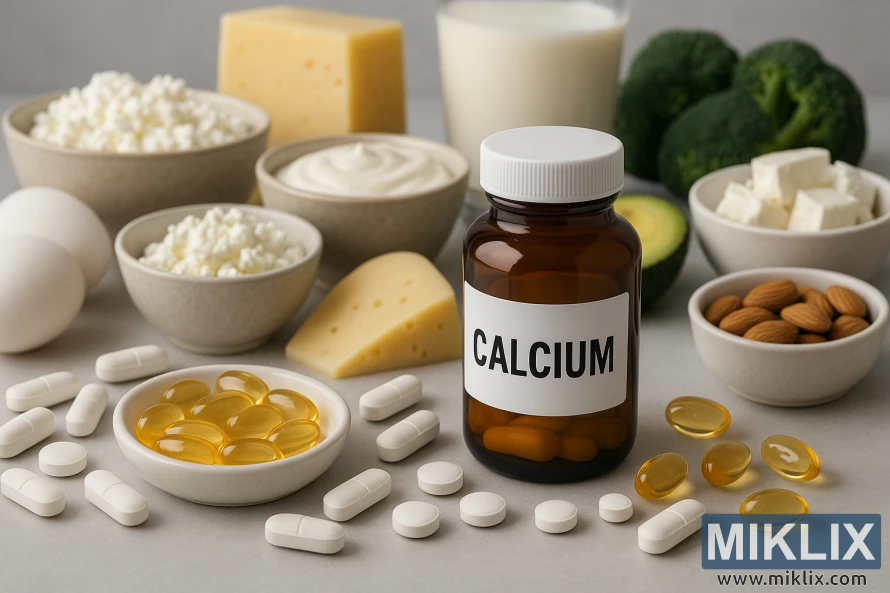
Best for Immune Support: Zinc
Key Benefits
Zinc is involved in numerous aspects of cellular metabolism and is required for immune function, protein synthesis, wound healing, DNA synthesis, and cell division. Research suggests zinc may reduce the duration of the common cold and support skin health.
Who Needs It Most
- Older adults
- People with digestive disorders affecting absorption
- Vegetarians and vegans (plant sources contain less bioavailable zinc)
- Those with compromised immune systems
- Individuals recovering from injuries or surgery
Usage Tips
The recommended daily amount is 8-11 mg for adults. Short-term use of higher doses (up to 40 mg daily) during illness may be beneficial but should not be continued long-term. Take zinc supplements with food to reduce stomach upset. Zinc lozenges for cold symptoms should be allowed to dissolve slowly in the mouth.
Long-term use of high-dose zinc supplements (above 40 mg daily) can interfere with copper absorption and potentially weaken immune function. Zinc nasal sprays have been linked to permanent loss of smell and should be avoided.
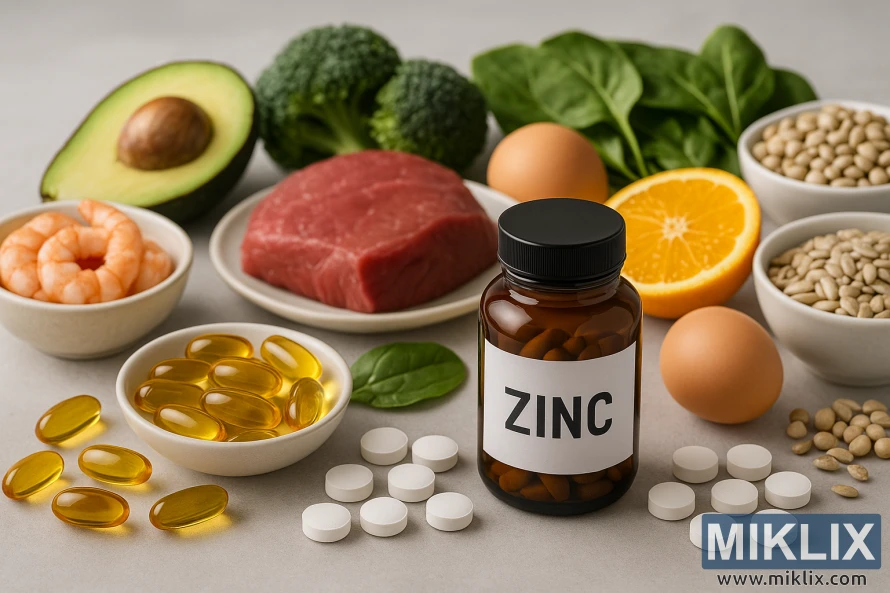
Best for Cellular Health: Folate (Vitamin B9)
Key Benefits
Folate is essential for cell division, DNA synthesis, and amino acid metabolism. It's particularly crucial during periods of rapid growth, such as pregnancy and infancy. Adequate folate helps prevent neural tube defects in developing fetuses and supports cardiovascular health by regulating homocysteine levels.
Who Needs It Most
- Women planning pregnancy or in early pregnancy
- People with certain genetic variations (MTHFR mutations)
- Those with digestive disorders affecting absorption
- Individuals with high alcohol consumption
- People taking certain medications (methotrexate, some anticonvulsants)
Usage Tips
The recommended daily amount is 400 mcg for most adults, with 600 mcg for pregnant women. When supplementing, consider methylfolate (the active form) rather than folic acid, especially if you have MTHFR genetic variations. Take with other B vitamins for optimal absorption and function.
Women planning pregnancy should begin folate supplementation at least one month before conception to reduce the risk of neural tube defects.

Supplement Comparison: Finding What's Right for You
| Supplement | Key Benefits | Best For | Typical Daily Dose | Potential Concerns |
| Vitamin D | Bone health, immune support | Older adults, limited sun exposure | 1,000-2,000 IU | Toxicity at high doses |
| Omega-3 | Heart and brain health | Cardiovascular support, inflammation | 250-1,000 mg EPA/DHA | Fish allergy, blood thinning |
| Probiotics | Gut health, immune support | Digestive issues, after antibiotics | 1-10 billion CFU | Strain specificity important |
| Magnesium | Stress, sleep, muscle function | Stress relief, sleep support | 200-400 mg | Digestive discomfort, laxative effect |
| Vitamin B12 | Energy, nerve function | Older adults, vegetarians/vegans | 250-1,000 mcg | Can mask folate deficiency |
| Vitamin C | Immunity, collagen production | Immune support, smokers | 250-1,000 mg | Digestive upset at high doses |
| Iron | Blood health, energy | Menstruating women, pregnancy | 8-18 mg | Harmful if not deficient |
| Calcium | Bone strength, muscle function | Postmenopausal women, older adults | 500-1,200 mg | Kidney stones at high doses |
| Zinc | Immune function, wound healing | Immune support, wound healing | 8-11 mg | Copper depletion at high doses |
| Folate | Cell division, pregnancy health | Pregnancy planning, heart health | 400-600 mcg | Form matters (methylfolate vs. folic acid) |
Food First: The Best Approach to Nutrition
While supplements can be beneficial, nutrition experts consistently emphasize a "food first" approach. Whole foods contain complex combinations of nutrients that work synergistically in ways that isolated supplements cannot replicate. Additionally, whole foods provide fiber, antioxidants, and phytonutrients not found in most supplements.
Vitamin D-Rich Foods
- Fatty fish (salmon, mackerel, sardines)
- Egg yolks
- Mushrooms exposed to sunlight
- Fortified milk and plant milks
- Fortified cereals
Omega-3-Rich Foods
- Fatty fish (salmon, mackerel, sardines)
- Walnuts
- Flaxseeds and chia seeds
- Hemp seeds
- Algae (for vegans/vegetarians)
Probiotic-Rich Foods
- Yogurt with live cultures
- Kefir
- Sauerkraut
- Kimchi
- Kombucha
- Miso
Magnesium-Rich Foods
- Dark leafy greens
- Nuts and seeds
- Whole grains
- Legumes
- Dark chocolate
- Avocados
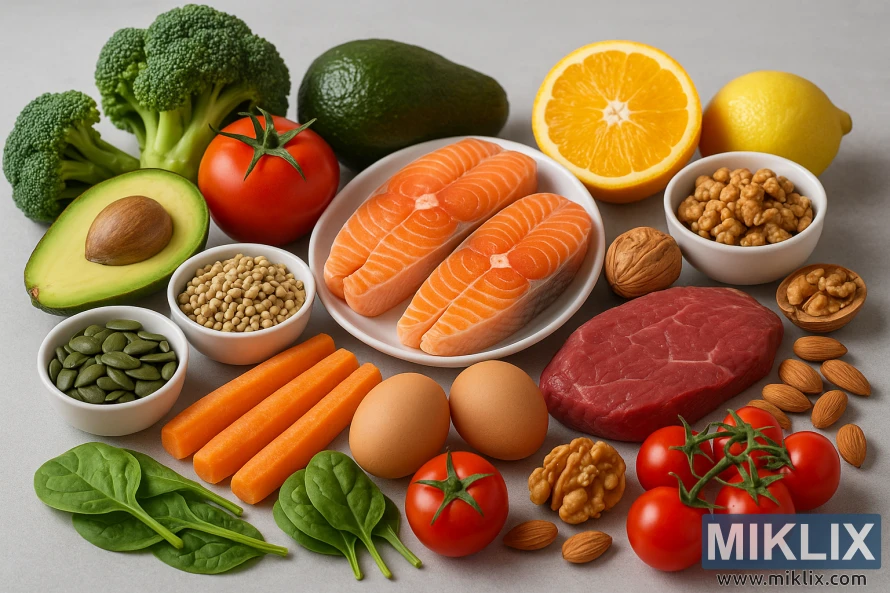
Making Informed Decisions About Supplements
The most beneficial food supplements are those that address your specific nutritional needs, which vary based on age, diet, health status, and lifestyle factors. Before adding any supplement to your routine, consider these key steps:
- Consult with a healthcare provider to identify any nutritional deficiencies through appropriate testing.
- Evaluate your diet to determine which nutrients you may not be getting in adequate amounts.
- Choose quality supplements from reputable manufacturers that undergo third-party testing.
- Start with the minimum effective dose and monitor for benefits and side effects.
- Regularly reassess your supplement regimen as your health needs change.
Remember that supplements are meant to complement, not replace, a balanced diet rich in whole foods. The foundation of good health remains a varied diet, regular physical activity, adequate sleep, stress management, and proper hydration.
Further Reading
If you enjoyed this post, you may also like these suggestions:
- From Root to Remedy: How Beets Boost Your Health Naturally
- A Clove a Day: Why Garlic Deserves a Spot in Your Diet
- Why Raspberries Are a Superfood: Boost Your Health One Berry at a Time
